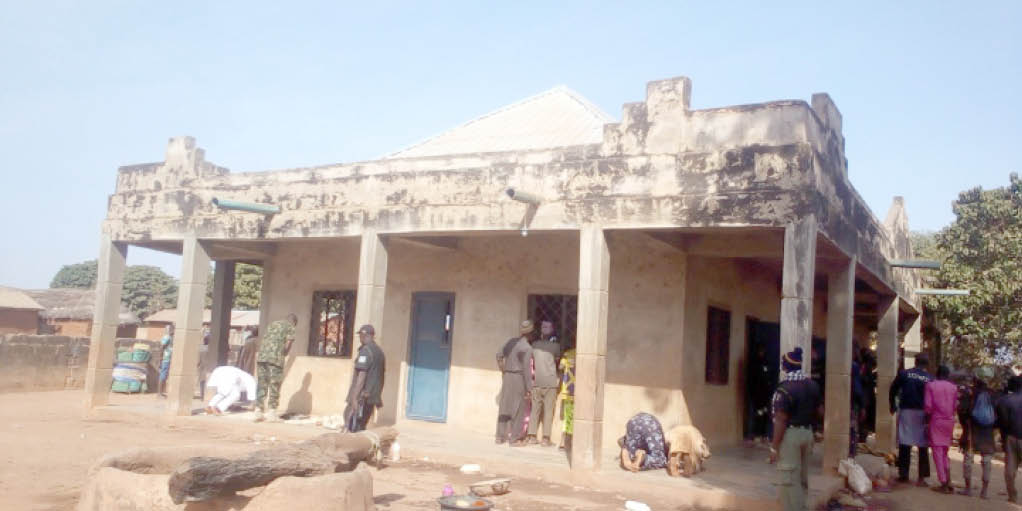The people of Tungan Ba’are in Mashegu Local Government Area of Niger State have not recovered from the shock of the recent bandit attack on their community as they now look frustrated and traumatised.
The attack saw to the killing of 17 worshippers in a mosque and the kidnapping of 19 others, among them nursing mothers.
- ‘Why Osinbajo is most competent for 2023 presidency’
- Challawa-Panshekara Interchange: Commuters, traders lament project delay
The locals told Daily Trust correspondent that following the incident their farming activities had further been threatened by bandit attacks in the area.
The situation they said was made worse by non-availability of mobile network service in the area and the deplorable nature of the road connecting communities to the highway which hindered immediate security intervention in the face of attacks.
The route connecting Tungan Ba’are, Adogon-Mallam and Maza-Kuka from the highway should not take more than 45 minutes by road, but Governor Abubakar Sani Bello and his entourage spent about five hours on the sandy road.
Mobile network service for all networks was not available for over eight hours in the villages. Some villagers were seen on motorcycles with luggage fleeing their ancestral homes for fear of fresh attacks even when the governor was visiting.
In Tunga Ba’are, it was frustration and uncertainty as Gov Bello sympathised with them over the attack. Ba’are community was invaded on Wednesday, December 8, 2021, by bandits where the 17 worshippers were killed while performing their early morning prayers.
Gov Bello called on the communities to be vigilant and observant of the activities in their neighbourhoods.
He explained that the visit was aimed at obtaining firsthand information on the incidents to enable his government restrategise and plan on how to prevent recurrences.
One of the strategies is to harmonise the vigilante corps in the state. Gov Bello had earlier signed into law the Vigilante Corp Law to boost the activities of the corps and strengthen the internal security architecture in the state.
He said the state government was working hard to ensure that voluntary security organisations in the state were reorganised; “bringing them into a unified structure based on the signed law and to have optimum performance. The voluntary sector would contribute to internal security architecture of the state which would support the existing conventional security in the state.
“I decided to come and see what has happened, get firsthand information so that we can plan how to stop such things from happening going forward. It is unfortunate that people are being attacked while saying their prayers early in the morning. We are not happy seeing this happening.”
He said the issue of informants must also be dealt with to end the assaults on communities, insisting that the success in the fight against bandits lay to some extent on communities disclosing the bad elements among them who serve as informants to the bandits.
Gov Bello urged them to work out modalities on how to fish out bad eggs among them so as to assist the security agents in curtailing the situation; pointing out that there could not be a successful attack without an insider.
He said, “I understand that it is the work of bandits; probably with the connivance of some locals. So I call on the community members to pay attention to their neighbours and to be very observant of what is going on around them.”
The governor then assured the people that government would not rest on it oars in evolving measures that would prevent recurrences, expressing optimism that the commission of inquiry he had earlier set up would do a thorough job.
The Council Chairman of Mashegu, Alhaji Alhassan Isah Mazakuka, said 17 people were killed, 19 kidnapped and eight injured during the attack.
The Ward Head of Tunga Ba’are, Alhaji Garba Aliyu, described the incident as horrible and traumatic, explaining that their men and women were taken away by the bandits.
He called on government to empower the vigilantes, reiterating that insecurity in the area was becoming incessant.
He also confirmed that 17 persons were killed while 19 others, mostly women, were kidnapped during the attack
He said, “We were observing congregational prayers when they came. They first went into our houses and they gathered our women. I was in the mosque too. When the imam ended the prayer, before we could tell people to leave the mosque through the entrance of the chief imam, they opened fire because they entered from the back door. Some people were able to escape but 17 people were killed inside the mosque.”
One of the vigilantes, Mohammed Sani, said they could not confront the bandits who were armed, more so that they were in the mosque and caught unawares.

The vigilante, therefore, said, “We are appealing to authorities and we are praying to Allah to bring this problem facing us as a nation to an end. We cannot take the law into our hands, but we want authorities to come to our rescue.”
Another resident, Mohammed Garba, said, “They held our community to ransom. Even those of us who were able to escape the assault was because of the mercy of Allah. They would have finished us.”
Another resident simply identified as Umar told Daily Trust that three women, including a nursing mother, were kidnapped in his house.
He said they had not slept since the incident and that the bandits were yet to communicate them six days after the attack.
Haruna Abdullahi, who said his son, Mohammed Sanusi, was killed in the attack lamented that they had not been able to harvest their farm produce this season due to the fear of being kidnapped by the bandits who he noted operated freely in their area.
Meanwhile, Gov Bello also visited Maza-Kuka in the same LGA where a similar attack that killed 18 worshippers was launched on October 26, 2021.
The villagers who revealed that they still lived with the trauma long after the attack said they had forgiven the perpetrators, but the governor was quick to say that the crime was unforgivable, assuring that the perpetrators would be made to face the full wrath of the law.
The Commissioner for Local Government, Community Development, Chieftaincy Affairs and Internal Security, Emmanuel Umar, revealed that some arrests had been made in connection with the killings in Maza-Kuka.
When contacted by Daily Trust, the Niger State Police Command spokesman, DSP Wasiu Abiodun, said six persons had been arrested and that they had confessed to being the bandits that attacked.
He gave their names as Mohammed Lawali, Suleiman Ibrahim, Mohammed Rebo, Bashir Audu, Monsoru Abubakar and Abubakar Hamidu.
According to DSP Abiodun, “Investigation by the police team revealed that the gang leader, Mohammed Lawali, and some of the gang members are escapees from the Lokoja Correctional Centre. Bashir Audu was arrested for his criminal role of supplying hard drugs to the gang. Two AK-47 rifles, three loaded magazines and various parcels of hard drugs were recovered from them.”
Recall that the Tungan Ba’are’s attack came less than two months after Maza-kuka experienced a similar incident. The attack on Maza-Kuka subsequently degenerated to a communal clash as hunters in Maza-kuka allegedly attacked Adogon-Mallam, a neighbouring community, where no fewer than nine lives were lost on the allegation that they knew the attackers.
Residents of Adogon-Mallam told Daily Trust that banditry in the area had equally affected long established communal relationships as communities saw their neighbouring communities as enemies.
Maza-Kuka, Adogon Mallam and other communities in Mashegu have experienced series of banditry attacks that led to the killing of many people in recent times, just as dozens were also kidnapped with farm produces sold to pay millions as ransom.
Daily Trust recalls that Gov Bello inaugurated a commission of inquiry to determine the remote and immediate causes of the unfortunate incident between Maza-Kuka and Adogon-Mallam.

 Join Daily Trust WhatsApp Community For Quick Access To News and Happenings Around You.
Join Daily Trust WhatsApp Community For Quick Access To News and Happenings Around You.

